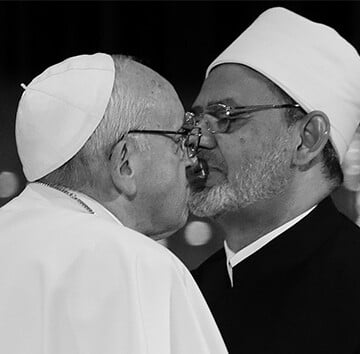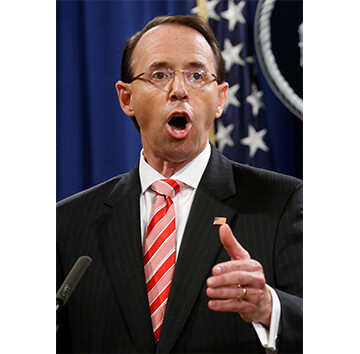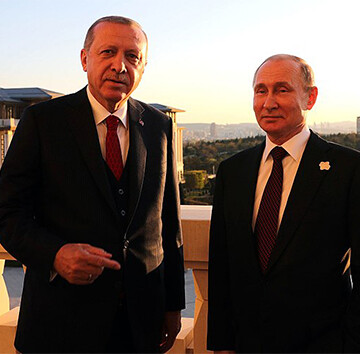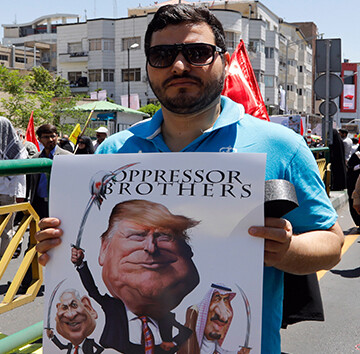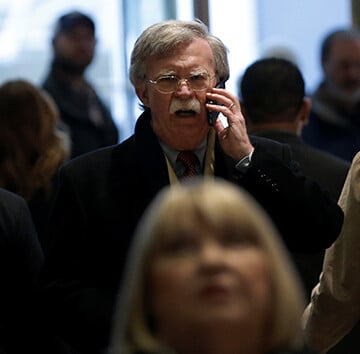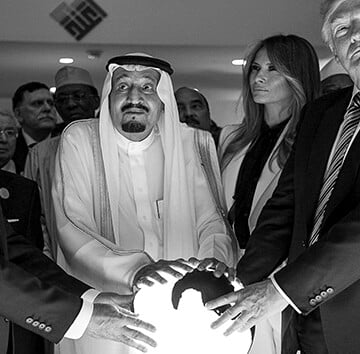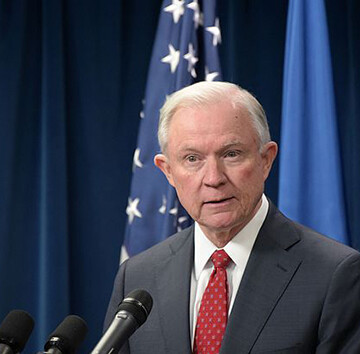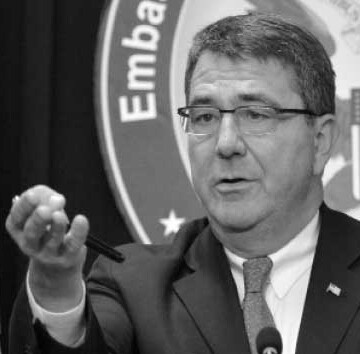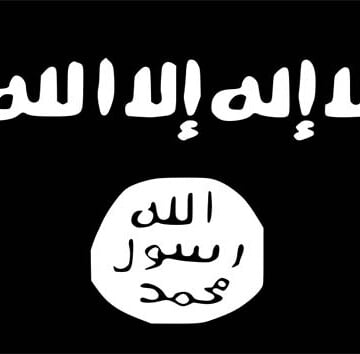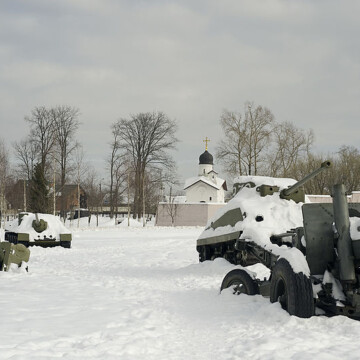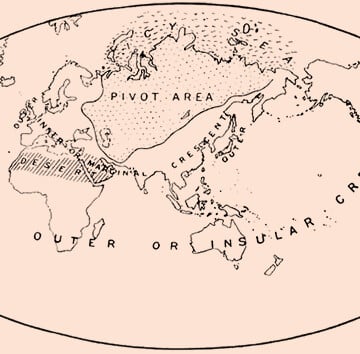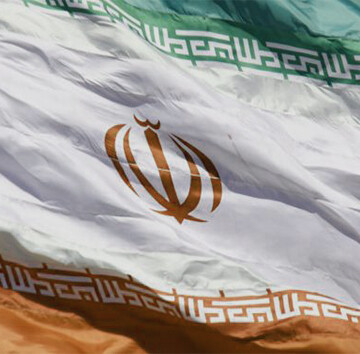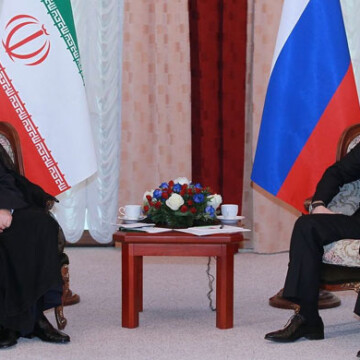Violent incidents, perpetrated by the opponents of a tyrannical regime, tend to enable such regimes to become openly terrorist. They may have been on a brutal trajectory all along, but their enemies’ acts of desperate defiance (or plain insanity) often facilitate their transition to the level of oppression which had been desired all along. Charlotte...
The Wall: Moral and Good
President Donald Trump’s predecessors have circumvented Congress before on issues the legislative branch had tried to stop. They have redirected resources appropriated by lawmakers. They have resorted to the same National Emergencies Act that Trump is invoking in order to build the Wall along the country’s southern border. None of their actions triggered a reaction...
The Pope and the Art of Self-Deception
Pope Francis, the first Pontiff to visit the Arabian Peninsula, attended a hugely publicized interfaith meeting in the United Arab Emirates on February 4 as part of what the Vatican described as his “outreach to the Muslim world.” The following day he held an open-air Mass in Abu Dhabi, attended by 135,000 Catholic guest workers...
After Helsinki: A Coup in the Making
President Donald Trump’s meeting with President Vladimir Putin of Russia and their joint press conference in Helsinki on July 16 have ignited an ongoing paroxysm of rage and hysteria in the U.S. media. Morbid Russophobia and Putin-hate are déjà-vu, but the outpouring of vitriol against Trump has been raised to an entirely new level. The...
Erdogan Unleashed
A successful national leader (“good” or “bad”) is able to redefine the terms of what is politically possible in accordance with his values, and to produce durable desired outcomes. Lincoln, FDR, and Reagan come to mind at home, and Churchill, De Gaulle, and Deng Xiaoping abroad. Very few are able to effect a profound, long-lasting...
Trump’s Iranian Gamble
The conventional view among antiglobalist conservatives is that President Donald Trump’s nixing of the Iran nuclear deal, coupled with the much-heralded relocation of the U.S. embassy to Jerusalem, is bad news. Their arguments are clear. America seems to be moving closer to another war of choice in the Middle East—potentially far more costly and devastating...
Syria: A Deep State Victory
The latest escalation of the Syrian crisis started with the false-flag poison gas attack in Douma on April 7. It was followed a week later by the bombing of three alleged chemical-weapons facilities by the United States, Britain, and France. The operation had two objectives. The first was the Permanent State interventionists’ intent to reassert...
Worse Than a Neocon
Until March 22, when the White House announced that John Bolton would replace H.R. McMaster as national security advisor, it was still possible to imagine that President Donald Trump’s many compromises with the globalist-hegemonist establishment had been made under duress. This may have been true once, but it is not true now. Bolton’s appointment indicates...
Fiddling on the Brink
A standard theme in the literature on the Great War is that hardly anyone expected it at the time. Europe’s last summer, balmy and idyllic, suddenly brought the guns of August. This view is not historically accurate—Germany willed the war, and her leaders engineered the July crisis—but for most other actors the catastrophe did come...
Rumors of War
By the seventh month of Donald Trump’s presidency a surreal quality to U.S. foreign policy decision-making had become evident. It is at odds with both the theoretical model and historical practice. When we talk of the “behavior” of states, what we have in mind is the process of decision-makers defining objectives, selecting specific courses of...
Travel Ban, and Beyond
The Supreme Court decided on June 26 to allow key parts of the Trump administration’s “travel ban” to go into effect temporarily. This was an unexpected victory for the President—and for common sense. Until the Court hears the full case in October, the administration will be able to bar travelers from six majority-Muslim countries who...
Wahhabism First
President Donald Trump started his first foreign tour on May 20 in Saudi Arabia. His two-day visit was punctuated by a series of embarrassingly poltroonish statements and gestures to his hosts. It culminated in a macabre sabre-rattling spectacle, the moral equivalent of tossing Zyklon B canisters into a Silesian compound in 1944. For his part,...
Adieu, France
Emmanuel Macron’s victory in the French presidential election provides conclusive proof that no major European nation can save itself from demographic and cultural suicide through the electoral process. That outcome is not merely a victory for status quo politics, which millions of lower-middle-class French people prefer, but a triumph of the globalist establishment. Macron is...
Confronting Russophobia
There is a paranoid, hysterical quality to the public discourse on Russia and all things Russian in today’s America. The corporate media machine and its Deep State handlers have abdicated reason and common decency in favor of raw hate and fear-mongering. We have not seen anything like it before, even in the darkest days of...
A Coup Most Foul
We have seen coups of sorts in Washington before, not that anyone one calls them that. (Remember JFK, Nixon.) The one against Trump is of a different order of magnitude. It had been plotted by the Deep State even before he was inaugurated. Significant power nodes had always refused to acknowledge the legitimacy of this...
Dealing With China
A country’s rising economic strength tends to be reflected in her geopolitical clout. In the late 1880’s the United States overtook Great Britain as the world’s largest economy; a decade later, having defeated Spain, America took over the remnants of her empire. During the same period Germany’s massive economic growth enabled her to establish colonies...
Depoliticizing Intelligence
Knowing what is going on in the Hobbesian world of international politics is an essential function of the state apparatus. Detecting, assessing, and countering external threats, real and potential, helped the Byzantine empire survive a thousand years longer than its Western counterpart—well beyond its strictly geopolitical potential for endurance. Essential to its longevity was its...
Dismantling the Empire
History never repeats itself, but we may compare certain pivotal events in the quest for meaning and order in an apparently chaotic world. Ronald Reagan’s victory in 1980 and Donald Trump’s unexpected triumph in 2016 differ in countless, relatively insignificant ways, but they share one key characteristic: True Americans have risen against an anti-America of...
Global Challenges in 2017
In terms of any traditionally understood calculus of national security, the United States is the most invulnerable country in the world. America is armed to the teeth, sheltered on two sides by oceans, and supremely capable of projecting her power to the distant shores. Unlike Russia, China, and India, she has no territorial disputes with...
Ashton Carter’s Flawed Strategy
There are two important lessons of history for an imperial strategist who wants to avoid the trap of overreach. The first is not to risk engagement in a new theater while an old crisis remains unresolved. Philip II of Spain sent the Armada to her doom while the rebellion in the Low Countries was still...
The Summer of Erdogan’s Content
Combining elements of the Reichstag fire, the Night of the Long Knives, and Stalin’s Great Purge, Turkey’s president Recep Tayyip Erdogan took full advantage of the failed coup of July 15—a “gift from Allah,” as he put it—to execute a countercoup that has enabled him to purge all of his enemies, real or imagined. Within...
Confronting Jihad
Paris (twice in ten months), San Bernardino, Brussels, Orlando, Nice, Ansbach, Munich, Saint-Étienne-du-Rouvray: Hundreds of people blown up, pulverized, shot, knifed. Who is next? That such attacks will continue is certain. That the political class has no strategic blueprint for dealing with the scourge of jihad terrorism is obvious. That all Western security services have...
England’s Independence Day
The Brexit referendum of June 23 was a momentous event, comparable in long-term implications to the fall of the Berlin Wall a generation ago. It laid bare the yawning gap between the London-based political machine and the alienated and angry majority of “left-behind” citizens. Thanks to outgoing prime minister David Cameron’s miscalculation, the masses seized...
Strategic Crossroads
The aftermath of the Cold War has seen the emergence of what Robert Kagan and William Kristol have called “benevolent global hegemony.” The leaders of both major U.S. political parties have asserted that America’s unchallengeable military might is essential to the maintenance of global order. This period of “primacy” was marked by military interventions in...
Trump’s Global Vision
On April 27, Donald Trump gave a long speech on foreign policy. It was his first attempt to present his views on world affairs in detail. Refreshingly, it contained no reference to promoting freedom, democracy, and “human rights”; confronting tyranny and evil; or making the world a better place in the image of the exceptional...
Avoiding Europe’s Mistakes
The two jihadist attacks in Brussels on March 22, which killed 32 people and injured 300 others, have changed the tenor of European media commentary. While many editorialists have routinely bewailed “alienation” among Muslim youths and warned against “Islamophobia” and “intolerance,” a significant minority are considering the causes of terrorism with courage and frankness. In...
Syria: Time for Maturity
A successful strategist is able to balance costs and benefits in the attainment of clearly defined objectives. This task demands prioritizing: Primary and secondary political goals need to be articulated, and military resources allocated accordingly. The Obama administration’s strategy for defeating the Islamic State (aka ISIS) has failed so far because a secondary objective—Washington’s a...
Europe’s Ongoing Demise
“The Third Muslim Invasion of Europe is entering its mature stage by sea,” I observed in these pages in June, as thousands of Middle Eastern and African illegal immigrants sailed from Libya to Italy day after day. In the intervening four months, in a dramatic development, a new southeastern land route was stormed by a...
The Iran Deal in Context
On July 14, in Vienna, the United States, Russia, China, France, Germany, and the European Union signed a 109-page Joint Comprehensive Plan of Action (JCPOA) with Iran. The Islamic republic has accepted a comprehensive set of international, legally mandated, and (by implication) militarily enforceable safeguards that “will ensure that Iran’s nuclear program will be exclusively...
Bumpy BRICS Road
Until a year ago it had seemed that BRICS, the association of five emerging economies—Brazil, Russia, India, China, and South Africa—was morphing from a loose economic alliance into a geopolitical force willing and able to challenge the global order. Its members’ potential to do so appeared impressive: They account for three billion people (two fifths...
An Unhinged World
A few years after he was removed from office in 1890, Otto von Bismarck remarked that “Europe today is a powder keg, and the leaders are like men smoking in an arsenal.” At present, the Iron Chancellor’s dictum is applicable to the entire planet. The most important event by far this year has been Europe’s...
The Third Muslim Invasion
They came in the early eighth century across the Straits of Gibraltar, unleashing terror and carnage across Iberia “like a desolating storm.” They were stopped deep inside today’s France, at Tours, by Charles Martel in 732. They kept attacking Europe throughout the Middle Ages, but their next sustained assault was at her vulnerable southeastern flank,...
Israel’s House Divided
In the aftermath of Benjamin Netanyahu’s electoral victory last March, the “two-state solution” to the Arab-Israeli conflict is off the table for the foreseeable future. Netanyahu’s public disavowal of the two-state formula (despite his subsequent denials) was not a last-minute campaign ploy. It reflected his deeply held belief that Israel can survive and prosper by...
A Towering Genius, Greatly Missed
On April 1, 1815, Otto Eduard Leo pold von Bismarck was born on the family estate at Schönhausen near Berlin, in what used to be Prussia. He came into this world at the end of a quarter-century of pan-European crisis, which started with the French Revolution and ended with Napoleon’s defeat at Waterloo. Bismarck’s bicentennial...
A Jihadist Victory
The claim propagated in the Western corporate media that the “March for Unity” in Paris on January 11 symbolized a victory of “freedom of speech” over “extremism” is wrong. The attacks on Charlie Hebdo and a kosher supermarket, and particularly the aftermath of those attacks, were a victory for militant Islam and a fresh sign...
Putin’s Uneasy Balancing Act
“Putin, the master of the game, controls all the pieces on the chessboard and carefully divides up the areas of power,” writes influential French columnist Christine Ockrent in her most recent book, Les Oligarques. Her view is shared by most Western analysts and media commentators, regardless of their position on the person and policies of...
Rudderless at the Pentagon
Chuck Hagel’s abrupt departure from the Pentagon on November 24 became inevitable after weeks of disagreement with the White House over strategy against the Islamic State (IS). The split had become public a month earlier, when Hagel’s blunt two-page memorandum on Middle East policy was leaked to the press. Addressed to national security advisor Susan...
Another Unwinnable War
Two months after the beginning of the U.S. bombing campaign against the Islamic State (IS, formerly ISIS) and one month after President Obama announced his strategy for fighting the group, the area under jihadist control continues to expand. In the east, IS forces have advanced to the outskirts of Baghdad and may soon be able...
Staying Out of Another War
In the final days of August the stage seemed set for a major escalation of America’s air war against the Islamic State (IS, also known as ISIS or ISIL). The operation, which started with limited tactical strikes between Mosul and Erbil—initially to save stranded refugees, then to help the Kurds defend their capital—was about to...
Strategic Blunders
It has been a summer of major strategic blunders by the United States and Russia over Ukraine and by the United States in the Middle East, where the Islamic State in Iraq and Syria (ISIS, now renamed simply the Islamic Caliphate) has emerged as a major player, threatening what little remains of the region’s stability....
A Joint Criminal Conspiracy
The Great War started 100 years ago this August. The most tragic event in human history, that war destroyed a vibrant, magnificently creative civilization. A prosperous and well-ordered world was shattered forever. New killing machines that only a generation earlier did not exist were deployed on a massive scale: airplanes, tanks, poison gases, submarines. The...
A Big Deal
“This is the biggest contract in the history of the gas sector of the former USSR,” Vladimir Putin said after the $400 billion agreement to supply Russian natural gas to China was signed in Shanghai on May 21. It is much more than that, Putin went on: It is an “epochal event.” China’s President Xi...
The Folly of Overreach
To a casual observer it might seem that President Barack Obama’s four-nation tour of East Asia, which took him to Japan, South Korea, Malaysia, and the Philippines, came at a time of America’s undisputed global predominance. The visit strengthened existing U.S. military commitments to the region, created some new ones, irritated China, and emboldened American...
Moscow Rules
Spending the first three days of spring in snowy Moscow, especially after being in balmy Yalta and Sevastopol, is not my idea of fun. It is useful, however, when you write on foreign affairs and there’s a first-rate crisis under way between “Putin’s Russia” and the West. The overriding impression is that Moscow no longer...
Eastern Approaches
In April 1904, Scottish geographer Halford Mackinder gave a lecture at the Royal Geographical Society. His paper, “The Geographical Pivot of History,” caused a sensation and marked the birth of geopolitics as an autonomous discipline. According to Mackinder, control over the Eurasian “World-Island” is the key to global hegemony. At its core is the “pivot...
In Praise of Geopolitics
The noun geopolitics and the adjective geopolitical are increasingly present in media discourse on world affairs. In principle, this is a good thing. Relating political power to the immutable imperatives of space and resources is essential to an analysis of world affairs that is free from the ideological baggage of American exceptionalism, whether Wilsonian or...
A Vanishing Nation
Uit die blou van onse hemel uit die diepte van ons see, Oor ons ewige gebergtes, waar die kranse antwoord gee. When in 1918 Cornelis Jacobus Langenhoven wrote “Die Stem” (“The Voice”), the poem that became South Africa’s pre-1995 national anthem, by “our everlasting mountains” he meant the Drakensberg range that separates Transvaal from Natal. ...
Global Security Challenges in 2014
The year ahead is likely to bring unforeseen foreign-policy challenges. Two years ago nobody anticipated the “Arab Spring,” and that phenomenon’s causes, significance, and future developments are still a matter of dispute. The North Korean regime is fundamentally less stable than at any time since the 1950-53 war, and its sudden unraveling could cause a...
An Uncertain Asian Pivot
Nicholas Spykman died 70 years ago, more than two years before Japan’s defeat, but his analysis of America’s role in the world, and the challenges she will face in the Far East, sounds almost prophetic today. The Dutch-born Yale professor caused a scandal when he wrote in 1942—only months after Pearl Harbor—that America’s chief regional...
The Middle East: Steady as She Goes
To paraphrase Camus, he who despairs of the condition of the Middle East is a coward, but he who has hope for it is a fool. In a permanent disaster zone, the best one can hope for is that things will not get worse—not too soon, anyway. Things did get better in the Middle East...
